- Home
- Anne Easter Smith
This Son of York Page 35
This Son of York Read online
Page 35
Donning his heavy, fur-lined cloak and whistling to his new wolfhound pup Rufus, so named for the reddish tinge to his coat, Richard trudged purposefully through the ankle-deep crusty snow. The unexpected noise startled two hares, who loped off as fast as their long legs could propel them from the excited hound, whose own overgrown legs skidded on the slippery surface. Richard had purposely waited before choosing another dog; none could have bested his first dog, but Rufus’s grandsire was Captain and, like Traveller, had been born at Fotheringhay. Traveller would have known exactly where Richard was headed, but Rufus approached the old stones only when Richard began clambering over them, and then he bravely made his mark. Several ungraceful attempts later to follow Richard higher, the dog eventually gave up, taking shelter under a crumbling arch.
On his usual perch that bitter winter day, where Richard had always felt close to God, he had never felt so distant from the Almighty. The bleak, pristine-white landscape, the winter quiet and the wide gray sky reminded Richard how vast the universe was that God watched over and how small and insignificant he was. And yet he knew God saw into every single heart and observed every living creature. Richard had no doubt that his heart was of special interest to his Maker and was why he had been punished with a crooked spine. The burden of his great sin weighed heavily on him, and he pulled his cloak tighter. He nevertheless bravely begged the Almighty to bless his union, bless the child that would come into the world on such an auspicious day, and watch over his beloved wife in childbed. Dare he even hope that the loss of their first attempt might have been atonement enough for Henry’s death? He chose to believe it today, and murmured his thanks for his good wife and the child she bore. So, for a few pleasant moments he allowed himself to bask in his blessings.
But he could not banish the darker thoughts that crowded his brain every day. He had established himself as Lord of the North with relative ease, and had won praise for his generosity, not only for protecting his mother-in-law but for taking in as his ward the son of the traitor, Montagu. He was proudest of his rapprochement with the unpredictable lord of the borderlands, Henry Percy, the earl of Northumberland. With the two of them working in tandem to keep the peace in Edward’s northern territories, the often rebellious natives had gladly settled into a period of calm.
Richard still questioned some of Edward’s policies—especially the power the king had afforded his wife’s ambitious family, the Woodvilles, even superseding Richard’s jurisdiction in Wales. Elizabeth and her brother, earl Rivers, had taken over Ludlow Castle to establish the household of young Edward, prince of Wales. The prestigious position of governor of the prince was also given to Rivers, which Richard had the foresight to recognize was a dangerous move. Richard determined to tell his brother about the hostility the rest of the peerage felt towards the queen’s family, for it seemed Edward was oblivious and firmly under his wife’s thumb.
Puzzled why Elizabeth would put up with Edward’s infidelities, Richard harrumphed loudly, startling Rufus. He slapped his forehead. “Of course,” he muttered, “she lets him have what he wants in exchange for what she wants. And she wants power. How stupid of me.”
Frowning, his thoughts turned, as they always did, to the division in his family. Why did George persist in provoking Edward? And now it would seem Richard himself had become an object of George’s enmity, for during those summer and autumn months he had been laying up arms. Would George actually try to do him harm? Or his foolish brother might again be thinking of colluding with Lancastrians against Edward. No one, not even Richard, dared voice the treasonous insinuations, but he did not doubt the possibility. Rumors had even circulated that George’s name was associated with a failed invasion by the Lancastrian earl of Oxford in September, although nothing was proven. Even so, Richard pondered, did the foolhardy George still believe he could unseat his brother and take the crown?
Richard shook his head. How could he make George see the futility of his ambition and bring him back to the family fold? He was forced to acknowledge he actually did not want to; he could care less what happened to George. He sighed deeply, feeling helpless and angry at the same time; besides, he did not dare to ask God for any more favors at this point.
The loud wail of a shawm shattered the silence, and Rufus barked. For an instant Richard thought it came from heaven, and he crossed himself. The logical instinct was to reach for his sword, but certes, he had left without it. Was there an advancing army? Was it George? Nay, you fool, he realized happily, it must mean the babe has come.
He scrambled down from the ruin and ran as fast as the snowy ruts allowed him back through the postern gate, up the Round Tower’s steps to Anne’s chambers. He was met by his mother-in-law, wreathed in smiles. “Where have you been, Richard? Your son was born an hour ago, and you were nowhere to be found. I had to sound the alarm! But rest easy. Mother and child are well, and Anne was very brave.”
Richard let out a whoop, gave Countess Anne a smacking kiss, and barely knocked on his wife’s door before bursting in. A moment later he held his little son, swaddled up to the chin, and marveled at the perfection of the child, who stared placidly up at his father. Richard swore later that the baby had smiled. “He knows me,” Richard enthused, “and, I cannot believe this, but he looks like…someone, I could swear.”
Anne chuckled wearily. “Let me help you, my dear. He took his time, seemed quite content to come into this world, charmed everyone, and took to the breast like a duck to water.” There was a glint in her eye. “I, too, was reminded of someone.”
Richard laughed out loud. “Edward! He reminds you of Edward.”
“And so, with your blessing, we shall name him for his royal uncle,” Anne declared, and addressing her son, added, “How do you like it, Edward of Middleham?”
There, snuggling into the richly hung tester bed, the fire crackling in the hearth, Richard held his wife and son. He had never been happier, but he did not dare to hope God had smiled on him.
Chapter Twenty
1475–1476
Usually a bucolic spot dotted with sheep, Barham Downs was now teeming with soldiers, horses, carts piled high with harness, artillery, and tents as far as the eye could see. Richard arrived with his army from the north, an army he had been mustering for several weeks now. He gazed south to the coastline and the silvery sea. On a clear day one could see the faint line on the horizon that was France.
Edward was going to war with Louis. Over what, Richard had not quite understood when he had received the command to bring troops to Kent to support an invasion of their long-time adversary. He had been pleased to have raised three hundred more men than Edward had demanded. Richard might not have admitted it, but it spoke highly of his popularity in the north country.
For close to three years, he had been content to carry out his administrative duties as Lord of the North, hear petitions, mete out justice and settle land disputes, as well as maintain good relations with the northern nobles and keep a watchful eye on the Scots. It may have been coincidence, but Richard’s good governance of the north paralleled his father’s ability to bring the rival Irish factions together during his lieutenancy in Ireland twenty years earlier. By only rarely moving among his castles of Middleham, Sheriff Hutton, Richmond, and Pontefract, Richard was able to be an attentive father and faithful husband. Young Ned was the joy of his parents’ life, a happy, energetic toddler beginning to babble his first words. Standing on the steps of Middleham, it was with reluctance that he bade his son and anxious wife farewell to go to war.
“Come back to us, Richard. Come back whole,” Anne whispered as he kissed her. “We shall pray for you hourly.” Eighteen-month-old Ned giggled as his father nuzzled his neck, and Rufus pinned back his ears and regarded Richard with soulful eyes.
“I shall be back soon,” he told them all, bending down one more time to pet his dog.
After seeing his men billeted on a decent patch of the grassy hillside, he went off in search of Edward’s contingent. Th
e lack of the royal banner told Richard that the king must be housed in greater luxury elsewhere—no drafty tent for Edward, Richard thought scornfully. News of his brother’s continuing descent into hedonism had disappointed Richard greatly and made him ever more determined to steer a righteous path and follow his father’s example. Richard of York had been a capable Protector during Henry’s madness, and progressive, steady lieutenant governor of Ireland before Richard was born—those troublesome subjects still harboring goodwill towards anyone bearing the York name.
As he stepped between groups of soldiers seated or lying back on the chalky grass, some preparing a meagre meal or polishing a blade, he paused to greet a billman here or an archer there or admonish two that were brawling. “Keep your fighting spirit for those Frenchies,” he said, pulling them apart. When they recognized his White Boar on murrey and blue, their eyes widened and they fell on their knees. Richard grinned at them and gave them both a friendly cuff. “I know ’tis tedious waiting, but you’ll be glad you rested once we face the enemy.”
“That’s Gloucester! They say he be a good commander,” Richard heard one in the group say as he moved off. “Better him than his prick of a brother, they say. Clarence only cares for hisself.” It was only too true, but Richard was sorry to hear it from the yeomen.
“Lord Gloucester!” the booming voice of Jack Howard hailed him from farther up the hill, and he hurried down to meet Richard as fast as his stocky legs could carry him. “Well met, my lord. With your northern troops assembled, I can send word to the king that we are all mustered. Did you know he is sending me as envoy to treat with Louis first?”
Richard grasped his hand, glad to see his old friend, although Jack would always bring thoughts of Kate to mind. “You are just the man I wanted to see, Jack. Perhaps you can explain the logic behind this invasion—the king has failed to enlighten me.”
Jack laughed. “Invasion is a lofty word, in truth, although,” and he waved his arm in the direction of the coast, “the Conqueror undertook a successful one a few miles from here, did he not? My role is to persuade the Spider to give up what was ours by right (thanks to that same Conqueror). I shall leave on the morrow with Lord Stanley. But to answer your first question, we aimed to use our alliance with Charles of Burgundy to force Louis to return Normandy and Gascony to us. The king and council believe that, by mustering an invasion force and having Charles’s army ready to join us across the channel, Louis will give in.” He furrowed his brow and kicked at a stone. “However, we had not reckoned with the self-interest of our ally Charles. They do not call him le Téméraire for nothing. His rashness or boldness, or whatever it means, has led him to ignore our treaty obligations and lay siege to some no-account city for so many months that we cannot hope for the full army he promised.”
Richard was dumbfounded. “So without our ally’s support, how can we defeat France with these?” He indicated the English troops. “If Charles were not to be counted on, why muster our troops? Surely ’tis a futile campaign and Edward should abandon it.”
“What? And infuriate the people of England? The poor bastards had to find money they did not have in the first place to fund this war. Can you imagine the fury if we return empty-handed having never fired an arrow? They won’t be refunded, you know. The king has enough disaffection on his hands now; he was counting on reclaiming the French crown to warm Englishmen’s hearts. Nay, we have to go.”
Richard nodded although now this expedition seemed like mere folly to him. “There are still those who remember Agincourt and the honor King Harry brought back to England. In truth, it was a blow to my father’s pride when Somerset lost France—he spent many a year in Normandy holding it safe for Henry.” He was always hoping his own chivalry both in war and at the council table measured up to his father’s high standards. In his wishful thinking, he wanted to believe Edward, too, was living up to it with this venture. “’Tis a worthy cause, I warrant—and if Charles is there, albeit with a smaller force, it is attainable.”
“He will be there,” Jack assured him, “and we have St. Pol’s and Brittany’s support as well. Edward’s plan is that Louis will be squeezed between the borders of Burgundy and Brittany.”
Richard pondered all this as he watched the many ships bobbing like toys in the faraway bay. His own ship The Mayflower was anchored somewhere in the flotilla, he knew. He had held the position of admiral of England since his tenth birthday, even before Edward made him Constable of England. It meant he drew income from the posts, and when he came of age at sixteen, he had been presiding over both courts whenever possible.
Jack Howard was used to the young duke’s way of sizing up a situation and waited patiently. Finally Richard asked: “Why is Edward wanting you to treat with Louis? What is he expecting to achieve? Let us set sail and get the business done—or is my brother afraid?”
“King Edward is afraid of nothing, Your Grace,” Jack assured him. “I was with him at Towton, Barnet and Tewkesbury, and in truth he is a fearless fighter. If I may speak frankly,” he paused to get Richard’s nod, “his weakness is indolence and too great a taste for fine living. He now prefers governing from a throne…” he refrained from adding “or a bed,” “than from the back of a horse.”
Richard shook his head. “I am sorry to hear you say this, but I, too, have worried. He did not learn it from our father. Let us hope he proves us wrong, and we will soon engage the French in our rightful cause.”
He walked off troubled by Edward’s decision. What could he do? Edward was king by God’s grace, and his word was thus the law.
Knowing how scornful Richard was that he was negotiating with Louis rather than fighting, Edward left his brother out of the group of high ranking nobles to meet the French king at Picquigny. The scene had not been pretty, and for once George had gained Edward’s favor by being the first to step forward and join his brother in the decision to pull out of France—provided Louis gave them incentive.
“Where is our honor?” Richard had demanded of those gathered at the council meeting in Amiens in mid-August. He could hardly contain his disgust. “Where is England’s honor in this? We have sat upon our backsides since crossing to Calais two months ago. Two months! And not a shot fired nor an arrow loosed. I am ashamed, and,” he dared to add, “our father would have been ashamed.”
Edward glowered at his brother, drumming his fingers on the arms of his chair, while his commanders and fellow lords uncomfortably observed the stand off. George stood so close to Edward he must have felt the heat of anger coming from Edward’s rigid body. He awaited the predicted eruption with glee though not a muscle of his face revealed any emotion at all. Here was his chance to supplant sanctimonious Richard in the eyes of the king.
“Does anyone else stand with Gloucester?” Edward growled. A few men shuffled their feet, and three stepped forward, but as none was of great account, Edward waved them off. “The majority wins,” he announced, rising. Richard’s strong stance had surprised Edward, but due to the high opinion Edward had of his brother’s honor, he attempted to appease Richard. “Without Charles’s help and now that St. Pol has once again turned his coat from us, we are at a disadvantage. Our spies have reported how Louis has ravaged the countryside from Paris to Picardy to keep us from resupplying our troops. With hungry soldiers, how are we expected to defeat the superior French army, brother? Besides, I have it on good authority that Louis would prefer not to fight and will even give us all pensions to leave.”
“Pay us? Pay us!” Richard was outraged. “Pay whom, may I ask? Pay the soldiers who have languished here since June earning a pittance when they could have been at home working their farms and feeding their families? By wasting so much time, you have eaten through the hated benevolences you taxed them to fund this so-called invasion. You have even denied them the chance to reap the usual spoils of victory. What of them, Your Grace, and you, my lords?” he turned in a circle accusing all those who stood with Edward. “How can you look your men in the eye and
send them home empty-handed while you line your pockets with French crowns?”
“Stop there, Richard!” Edward commanded. “You will abide by our decision, and you will sign the treaty with Louis. As your king, I command it.”
Richard’s gray eyes glittered black as he bowed to his brother. “I will do as you wish, my lord, but I want it known I will have no part in Louis’ peace pension,” and he backed from the room.
Not a few of the men who watched him go admired the determined duke, one of them being Will Hastings, who was to receive the largest pension from Louis after the king. Will attributed Richard’s refusal to the high-minded principles of youth; the older and more jaded one became, the more pragmatism wins the day, Will thought ruefully. But he pocketed the pension anyway.
Richard, however, left the meeting with bitterness for his brother’s lack of moral courage. The glorious, golden brother of his childhood had once again disillusioned Richard, and for the first time in days, that heavy disappointment in his heart caused his crooked back to ache and his shoulders to sag under its weight. He wished he could be spirited back to his Middleham solar, his wife quietly sewing next to him, and his adored young son bouncing on his knee.
He could hear the raucous results of Louis’s generosity to Edward’s commanders emanating from the Amiens’ alehouses, but he was in no mood for celebrating that night. He would take his pride, discontent, and his empty pockets back to his own rooms and confide in Rob and Francis. He would not even trust Jack with his frustration, for he knew even the ethical Lord Howard had accepted the French bribe.
“Devil take him,” he muttered as he made his way through the dark, muddy streets to his quarters. “Devil take ’em all.”

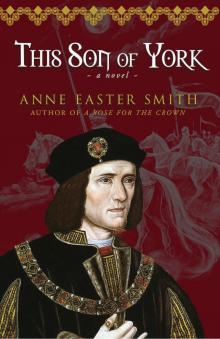 This Son of York
This Son of York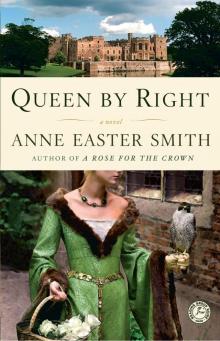 Queen By Right
Queen By Right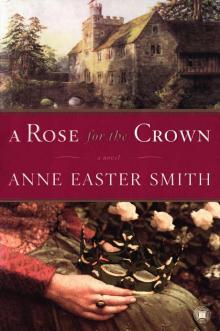 A Rose for the Crown: A Novel
A Rose for the Crown: A Novel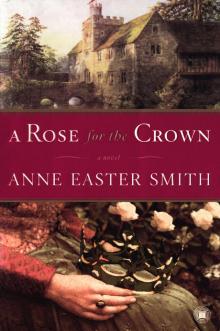 A Rose for the Crown
A Rose for the Crown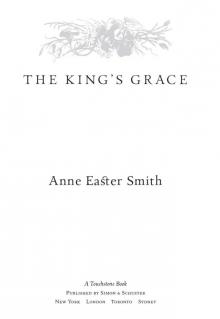 The King's Grace
The King's Grace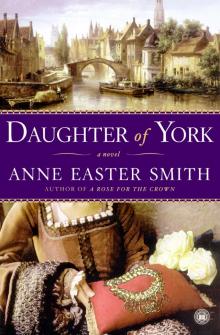 Daughter of York
Daughter of York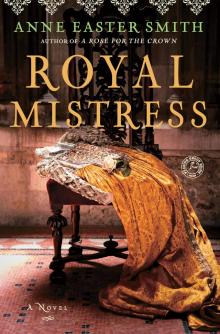 Royal Mistress
Royal Mistress